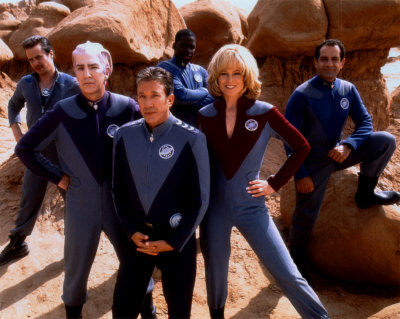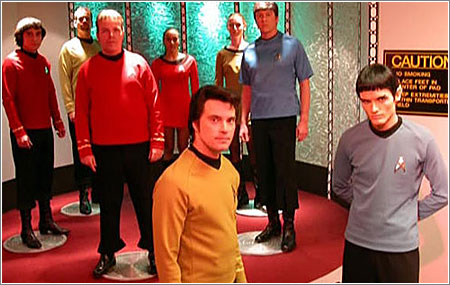a fan artifact presentation by Diana Pozo and David Pupkin

Easy Version:
Read the Jenkins Articles.
Watch “HuckChuckFacts.”
Scroll to the bottom and read the Important Questions to Consider.
Hard Version (not for the faint of heart):
In his article, “The Cultural Logic of Media Convergence,” Henry Jenkins discusses new trends in Internet publication such as blogging as they apply to politics, saying, “popular culture becomes the venue through which key social and political issues get debated. What models of democracy will take roots in a culture where the lines between consumption and citizenship are blurring?” Certainly, independent Internet commentators influence the way politics are run in the U.S. today from political blogs all the way through the CNN YouTube debates run for both the Democratic and Republican primaries. However, with convergence culture, the influences are never only one-way. Though “grassroots” Internet political activism may influence politics, politicians are also likely to use Internet culture to further their own goals.
2008 Republican presidential candidate Mike Huckabee uses convergence culture to appeal to a more diverse constituency than his traditionally conservative base by adopting the celebrity of Chuck Norris, a television actor and martial artist featured in Walker, Texas Ranger. Chuck Norris had, since 2005, been canonized over Internet messageboards and in the MMORPG World of Warcraft through a phenomenon named “Chuck Norris Facts.” Each “fact” credits Norris with one of an array of improbable superpowers and special abilities, such as “Chuck Norris can sneeze with his eyes open,” and “Chuck Norris does not sleep, he waits.” Though Chuck Norris’ television celebrity has led him to even create his own style of martial arts, and his well-publicized conservative politics were what led him to endorse Mike Huckabee’s candidature, Huckabee uses Norris’ Internet celebrity, and not his television celebrity to back up his campaign through an ad called “HuckChuckFacts.” In the ad, footage of Huckabee reciting “Chuck Norris Facts” is juxtaposed with Chuck Norris reciting facts of his own about Mike Huckabee’s policies. This ad gained so much publicity that Mitt Romney responded with his own Chuck Norris-themed video, criticizing what he claims to be Huckabee’s weak stance on crime, and claiming Norris’ attitudes as his own. However, this video received far less publicity (Romney’s ad received under 100, 000 views on YouTube, as opposed to the over 1 million views of just one posting of Huckabee’s Chuck Norris video).
Huckabee makes several important claims in “HuckChuckFacts.” First, his use of Chuck Norris to endorse his political campaign appeals to fans of Walker,Texas Ranger, a show beloved by social conservatives due to its appeal to a sense of “moral values,” its genre (the Western), and its glorification of traditional individualistic modes of heroism, as well as of the justice system. Second, Huckabee also draws on Chuck Norris and Walker, Texas Ranger’s campy appeal, through the use of his final frame, “Chuck Norris Approved,” in which a freeze frame of Norris’ face is combined with over-the-top “western” motifs, including a fist-shaped burn hole where Norris has punched the screen. Third, Huckabee lays claim to a sort of Internet panache through his use of popular Chuck Norris Facts familiar to many technologically-inclined Americans. Though contemporary Internet front-runners would say that a 2005 phenomenon such as Chuck Norris Facts is remarkably out-of-date, the large majority of Internet-savvy Americans would most likely recognize Huckabee’s appeal to a sense of being “in touch” with modern technology and younger constituents.
Jenkins’ theories about convergence culture center mainly around what he sees as an upcoming struggle between producers and consumers over rights to the use of major media products. In his chapter, “Quentin Tarantino’s Star Wars,” he seems to advise commercial producers that it would be in their best interest to allow fan producers almost free reign over media products, since their efforts often do more to promote the product in question than to challenge its validity or diminish its appeal. Jenkins also touches on the ways in which medial conglomerates try to harness and control the flow of fan productivity so that fan producers’ work becomes their property (Lucasfilm’s Star Wars web space, ex.), or so that they can police what content is allowed to be published (J.K. Rowling’s struggle with Harry Potter Lexicon author Steve Vander Ark, ex.). However, he spends much less time elaborating the ways in which major media producers can create their own products in traditionally fan-dominated media, such as digital video, using references derived from Internet popular culture, such as Huckabee’s reference to Chuck Norris Facts. Jenkins discusses how aspiring filmmakers such as George Lucas In Love co-creator Joseph Levy use the aura of a large media franchise like Star Wars to draw attention to their films, but he does not mention that big fish like Huckabee may be drawn to Internet culture icons like Chuck Norris in order to establish themselves as relevant to the everyday lives of a certain group of media users.
However, it is important to note that the Internet media that becomes profitable both for large media conglomerates and for grassroots producers themselves comes from a relatively small fraction of the overall Internet “population.” Jenkins’ chapter on Star Wars videos mentions the often gender-based disparity between producers of Lucasfilm-sanctioned “parody” videos, and Lucasfilm-condemned “fanfiction” videos. Similarly, the Chuck Norris Facts phenomenon was largely perpetuated by what Henry Jenkins calls “early adapters,” the members of the population most likely to respond to technological advancement. These early adapters are among the most privileged members of American society, since their financial resources and digital education allow them access to the latest hardware and software, as well as the know-how to use them in creative ways. It was these “early adapters” that moved Chuck Norris Facts from Conan O’ Brian Show segment, to messageboard joke to World of Warcraft application, and then rejected the phenomenon as out-of date. Jenkins may be arguing for more power to be placed in the hands of “consumers,” but which consumers will receive that power? Would this be a substantive change from the patterns of power and weakness observable more generally in American society?
***
Important Questions to Consider:
1. Is Huckabee’s use of Chuck Norris Facts an expropriation by conservatives of a movement that was originally designed to poke fun at traditional ideals of heroism? If so, does media convergence actually undermine the revolutionary potential of oppositional (fan) readings?
2. Among the Republican candidates for the presidency, Mike Huckabee and Mitt Romney appealed to Chuck Norris’ Internet following, while Rudy Giuliani and John McCain did not. Is there something about a candidate that would make him/her more likely to publish ads on YouTube and make reference to Internet culture than others?
3. We mentioned the CNN YouTube debates above as another example of how politics and Internet media collide. In what ways have you experienced the influence of Internet media or Internet culture on the world of politics? Do you believe the Internet is making significant changes to the way politics is reported to or received by the public?


